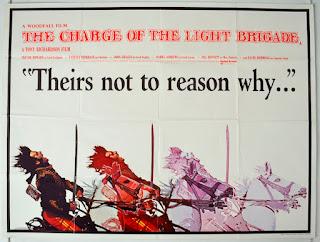
Inspired by the 1854 poem written by Alfred Lord Tennyson, which detailed a battle during the Crimean War in which the British Light Brigade was badly defeated by Russian troops, Tony Richardson’s 1968 film is the third cinematic version of this tale (the first, a silent film, was released in 1912. This was followed by Warner Bros. 1936 movie, directed by Michael Curtiz and starring Errol Flynn).
With a story so deeply rooted in the past, there are moments in ‘68s The Charge of the Light Brigade that feel stale. But it’s in the telling where Richardson sets his film apart, occasionally even falling back on humor in what is an otherwise very somber historical event.
The film opens in the days before the outbreak of the Crimean War (when Russia invaded Turkey, threatening to cut off Great Britain from its interests in India). Capt. Louis Nolan (David Hemmings) of the British Cavalry has just returned to England from abroad, and is reunited with his close friend, fellow officer Capt. William Morris (Mark Burns). He even attends Morris’ wedding to the lovely Clarissa (Vanessa Redgrave). Over the coming weeks, the three are inseparable, and as a result of their time together, Clarissa develops a crush on her new husband’s friend, amorous feelings that are returned by Nolan.
But Nolan is having issues of his own with their commanding officer, Lord Cardigan (Trevor Howard), the haughty, old-school Cavalry man who distrusts Nolan and does what he can to make the Captain’s life miserable.
Nolan appeals to Lord Raglan (John Gielgud), head of the Army, to intervene on his behalf, but Raglan has his hands full when the news breaks that Russia has invaded Turkey. England is at war!
With Lord Lucan (Harry Andrews), Lord Cardigan’s brother-in-law as well as his sworn enemy, appointed General of the Cavalry, and Cardigan himself heading up the Light Brigade, the troops set sail for the Crimea, where they hope to recapture the strategically important city of Sevastopol.
Lord Raglan and his aides put together a plan of action, but it becomes obvious to Nolan, Morris, and many of the younger troops that their battle-hardened superiors are out of touch with modern warfare, and could very well be leading them into disaster.
Much of what transpires in the opening hour or so of The Charge of the Light Brigade is interesting but cliché; the love triangle between Nolan, Morris, and Clarissa is certainly nothing new, and isn’t given enough time to really come alive. It feels crowbarred in, and, ultimately, unnecessary.
Also standard to many movies of this ilk are the showdowns between Nolan and Lord Cardigan (played to perfection by Trevor Howard), clearly designed by Lord Cardigan to knock the smart and experienced Nolan down a peg or two (the “Black Bottle” affair with Lord Cardigan is something that really happened, though Nolan, himself an actual historical figure, was not the solider involved).
That said, the second half of The Charge of the Light Brigade comes alive in a big, big way!
Along with the battle scenes, which are exciting, Richardson inserts a number of animated sequences into the mix. They are in the style of old-time patriotic cartoons, designed to praise the British military and demean its enemies. We get a taste of said animation right off the bat, during the opening credits, and it starts the movie off in entertaining fashion. Yes, these cartoons are jingoistic and over-the-top, but you get the feeling they are there to make us laugh as much as move the story forward (the frequency of these animated sequences increases once the war is in full swing).
Richardson and screenwriters Charles Wood and John Osborne also set their sights on the inept commanders of the British army at this point in history. Gielgud plays Lord Raglan as a kindly but senile officer whose decisions rarely make sense. The night before the big battle, Raglan ignores information supplied by a Russian defector, who warned of a surprise attack the next day. Raglan's reasons for doing so? Because this “spy” is a traitor with no honor! On top of this, Lord Cardigan and Lord Lucan allow their family squabble to interfere with their military relationship, bickering even as the enemy is approaching.
It all comes to a head in the final scene, after the battle is lost, when the elderly Commanders sit on their horses, passing the blame to one another. The images Richardson intersperses as the Generals argue and point fingers might make you laugh, but they more than likely will bring tears to your eyes.
An historic battle told in a very ‘60s style, The Charge of the Light Brigade, especially in the last hour, kind of blew me away.
Rating: 8.5 out of 10
